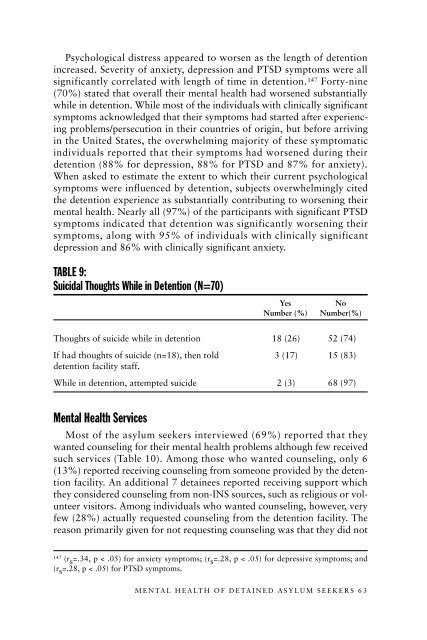From Persecution to Prison - Bellevue/NYU Program for Survivors of ...
From Persecution to Prison - Bellevue/NYU Program for Survivors of ...
From Persecution to Prison - Bellevue/NYU Program for Survivors of ...
You also want an ePaper? Increase the reach of your titles
YUMPU automatically turns print PDFs into web optimized ePapers that Google loves.
Psychological distress appeared <strong>to</strong> worsen as the length <strong>of</strong> detentionincreased. Severity <strong>of</strong> anxiety, depression and PTSD symp<strong>to</strong>ms were allsignificantly correlated with length <strong>of</strong> time in detention. 147 Forty-nine(70%) stated that overall their mental health had worsened substantiallywhile in detention. While most <strong>of</strong> the individuals with clinically significantsymp<strong>to</strong>ms acknowledged that their symp<strong>to</strong>ms had started after experiencingproblems/persecution in their countries <strong>of</strong> origin, but be<strong>for</strong>e arrivingin the United States, the overwhelming majority <strong>of</strong> these symp<strong>to</strong>maticindividuals reported that their symp<strong>to</strong>ms had worsened during theirdetention (88% <strong>for</strong> depression, 88% <strong>for</strong> PTSD and 87% <strong>for</strong> anxiety).When asked <strong>to</strong> estimate the extent <strong>to</strong> which their current psychologicalsymp<strong>to</strong>ms were influenced by detention, subjects overwhelmingly citedthe detention experience as substantially contributing <strong>to</strong> worsening theirmental health. Nearly all (97%) <strong>of</strong> the participants with significant PTSDsymp<strong>to</strong>ms indicated that detention was significantly worsening theirsymp<strong>to</strong>ms, along with 95% <strong>of</strong> individuals with clinically significantdepression and 86% with clinically significant anxiety.TABLE 9:Suicidal Thoughts While in Detention (N=70)YesNumber (%)NoNumber(%)Thoughts <strong>of</strong> suicide while in detention 18 (26) 52 (74)If had thoughts <strong>of</strong> suicide (n=18), then <strong>to</strong>ld 3 (17) 15 (83)detention facility staff.While in detention, attempted suicide 2 (3) 68 (97)Mental Health ServicesMost <strong>of</strong> the asylum seekers interviewed (69%) reported that theywanted counseling <strong>for</strong> their mental health problems although few receivedsuch services (Table 10). Among those who wanted counseling, only 6(13%) reported receiving counseling from someone provided by the detentionfacility. An additional 7 detainees reported receiving support whichthey considered counseling from non-INS sources, such as religious or volunteervisi<strong>to</strong>rs. Among individuals who wanted counseling, however, veryfew (28%) actually requested counseling from the detention facility. Thereason primarily given <strong>for</strong> not requesting counseling was that they did not147(r s =.34, p < .05) <strong>for</strong> anxiety symp<strong>to</strong>ms; (r s =.28, p < .05) <strong>for</strong> depressive symp<strong>to</strong>ms; and(r s =.28, p < .05) <strong>for</strong> PTSD symp<strong>to</strong>ms.MENTAL HEALTH OF DETAINED ASYLUM SEEKERS 63



